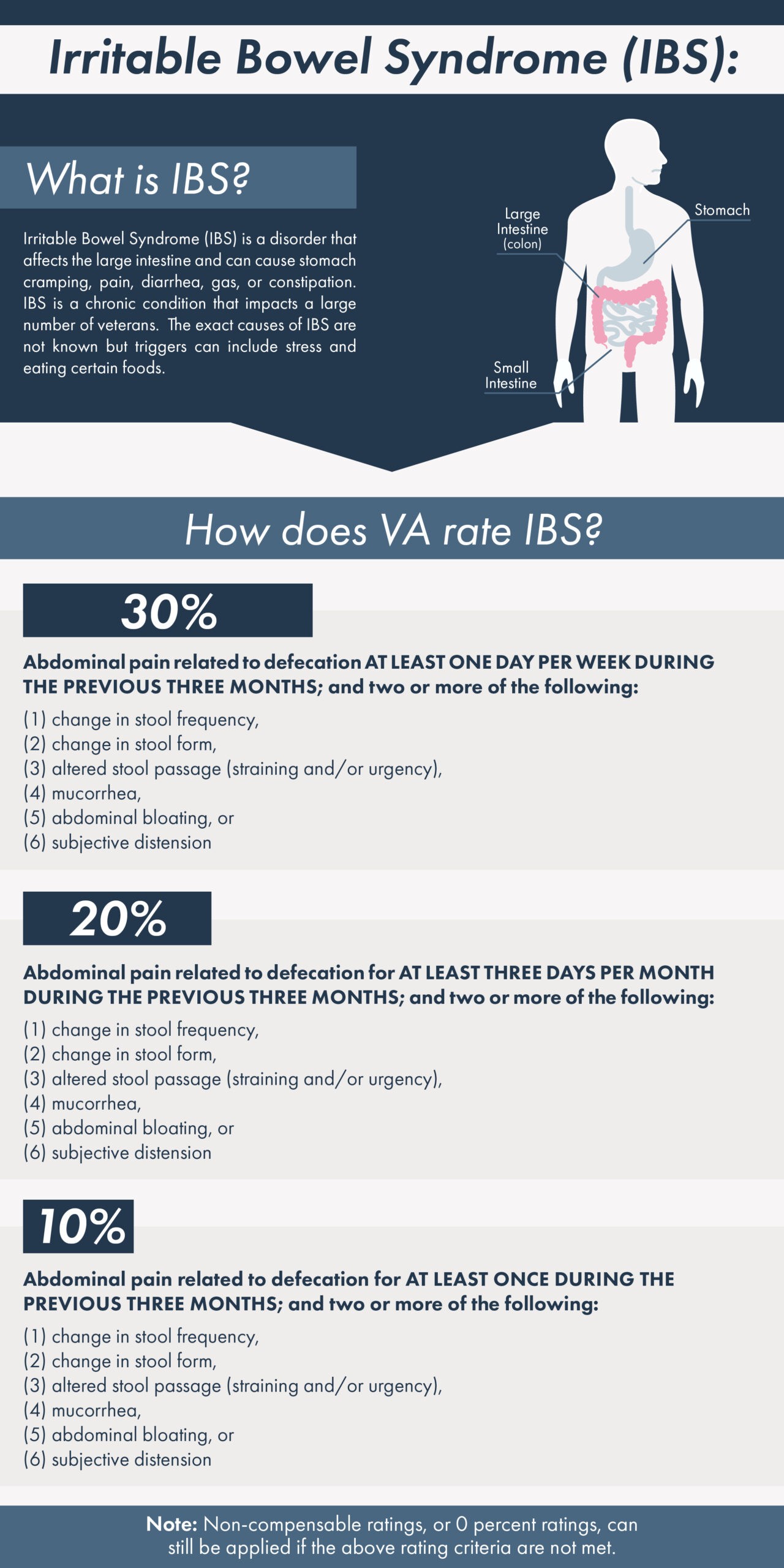VA Disability Benefits for IBS and GERD

CCK Law: Our Vital Role in Veterans Law
What is IBS?
Irritable Bowel Syndrome (IBS) is a chronic condition affecting the large intestine. IBS is best classified as a functional gastrointestinal disorder, or a disorder of the gut-brain interaction. People with this condition may experience gut sensitivity and other symptoms affecting the bowels.
The exact cause of IBS is unknown, but the condition affects many veterans. As of 2020, almost 150,000 veterans are service connected for irritable bowel syndrome.
Symptoms of IBS
- Stomach cramping
- Pain
- Diarrhea
- Gas
- Constipation
Types of IBS
There are a few types of IBS, as the condition can affect individuals in different ways:
- IBS-C—IBS C, or IBS with constipation, means a person faces abnormal bowel movements with constipation.
- IBS-D— IBS D, or IBS with diarrhea, means a person faces abnormal bowel movements with diarrhea.
- IBS-M—IBS M, or IBS with mixed symptoms, means a person faces abnormal bowel movements with both constipation and diarrhea.
What is GERD?
GERD, or Gastroesophageal Reflux Disease, is a digestive disorder characterized by the occurrence of stomach acid flowing back up the esophagus from the stomach, causing discomfort and inflammation. GERD can typically be managed through lifestyle and diet changes, however, some may need medication to control their condition.
GERD is caused by frequent episodes of acid reflux. At the bottom of the esophagus, there is a sphincter that allows food to pass down into your stomach and prevents it from traveling back up your esophagus. When this sphincter is weak, stomach acid can travel up your esophagus. Common symptoms can include heartburn, difficulty swallowing, regurgitation, and chest pain.
Symptoms of GERD:
- Nausea
- Vomiting
- Heartburn
- Difficulty breathing
- Coughing
- Painful swallowing
- Chest pain
- Stomachaches or other abdominal pain
What is the Connection Between IBS and GERD?
Both IBS and GERD are common conditions that affect the gastrointestinal tract. A study published in 2010 found that nearly 64 percent of patients in the study who were diagnosed with IBS were also diagnosed with gastroesophageal reflux disease. Additionally, nearly 34 percent of patients with GERD also had IBS. The study also found that women were more likely to experience both GERD and IBS at the same time than men were.
Many symptoms of IBS and GERD overlap, meaning people who experience both conditions likely face an increased risk of symptoms like vomiting, nausea, and stomach aches.
In the 2020 Annual Benefits Report released by VA, IBS was the third most common digestive disorder among all service-connected veterans who receive VA disability benefits. While IBS is a functional gastrointestinal disorder, meaning it is a disorder of the gut-brain interaction, GERD is not considered to be a disorder of the gut-brain interaction, according to the International Foundation for Functional Gastrointestinal Disorders.

VA Service Connection for IBS and GERD
In order to receive VA disability benefits for any condition, veterans will typically need to establish service connection. To do this, veterans should submit the following three things to VA:
- An in-service event, injury, or illness;
- A current diagnosis by a medical professional; and
- A medical nexus, or link, between your in-service event, injury, or illness and your current diagnosis.
Veterans can submit a claim for VA disability benefits on VA Form 21-526EZ. This can be submitted via mail to the Evidence Intake Center or electronically through VA’s website.
VA Disability Ratings for GERD
Under VA’s new ratings changes, GERD is now rated under Diagnostic Code 7206. It is no longer rated analogous to other digestive conditions.
A veteran may receive a rating for GERD of either 0, 10, 30, 50, or 80 percent. The rating a veteran receives will depend on different criteria they must meet.
GERD is rated as follows:
- 0 percent: The veteran must have a documented history of GERD but without daily symptoms or required daily medication.
- 10 percent: VA assigns a 10 percent rating for GERD if the veteran has a documented history of esophageal strictures. These strictures must require daily medications to control dysphagia otherwise asymptomatic.
- 30 percent: The veteran must have a documented history of recurrent esophageal strictures that cause dysphagia. The dysphagia must also require dilation no more than twice per year.
- 50 percent: VA assigns a 50 percent rating when the veteran has a documented history of either recurrent or refractory esophageal strictures that cause dysphagia. This dysphagia must require at least one of the following treatments: dilation 3 or more times each year, dilation using steroids once or more each year, or an esophageal stent placement.
- 80 percent: The highest rating for GERD, veterans must have a documented history of either recurrent or refractory esophageal strictures. These strictures must cause dysphagia and have at least one of the following symptoms: aspiration, undernutrition, or “substantial weight loss as defined by § 4.112(a) and treatment with either surgical correction of esophageal stricture(s) or” a PEG tube.
VA Disability Ratings for IBS
The Department of Veterans Affairs (VA) rates irritable bowel syndrome under 38 CFR § 4.114, Diagnostic Code 7319 for Irritable Bowel Syndrome. VA disability ratings for IBS range from 10 to 20 to 30 percent, depending on the severity of symptoms.
The criteria for each VA IBS rating are as follows:
- 10 percent: The veteran experiences abdominal pain at least once as a result of defecation during the previous three months. Additionally, they must experience two or more other symptoms of IBS. These symptoms are stool frequency changes, stool form changes, straining or urgency, mucorrhea, and subjective distension.
- 20 percent: The veteran experiences abdominal pain at least three days per month as a result of defecation during the previous three months, along with two or more symptoms as noted above.
- 30 percent: The veteran experiences abdominal pain at least once per week as a result of defecation during the previous three months, along with two or more symptoms as noted above.
Non-compensable ratings, or 0 percent ratings, can still be applied if the above rating criteria are not met.
Additionally, Diagnostic Code 7319 may include other functional digestive disorders. These disorders can include dyspepsia, functional bloating and constipation, and diarrhea.
Can Veterans File for Both IBS and GERD?
If a veteran is not currently service-connected for either GERD or IBS, but has been diagnosed with both conditions, then they can file for both at the same time. Veterans may also wish to submit a lay statement to outline how the symptoms affect them on a day-to-day basis, what medications they take to manage their symptoms, or what lifestyle changes have become necessary. VA will then assess both claims.
If warranted, VA will award service connection and issue a disability rating for whichever condition warrants a higher rating. For example, if the veteran’s IBS only warranted a 30 percent rating, but their GERD symptoms warranted a 50 percent rating, then VA should rule in the veteran’s favor and grant a 50 percent rating for GERD.
In some instances, VA may also take into consideration the symptoms of both conditions and give a rating under one GI condition. An example of this would be if VA granted a 50 percent rating for GERD with IBS symptoms.
However, it is important to understand that VA will not give two separate ratings for both IBS and GERD. This is because these conditions present with similar symptoms, and both affect the digestive system. Awarding two separate ratings for IBS and GERD would be considered an example of pyramiding.

TDIU With IBS and GERD
Any VA rating can contribute to a veteran’s eligibility for TDIU. TDIU, or Total disability based on individual unemployability (TDIU), is a disability benefit available to veterans who are unable to obtain or maintain work on account of their disabilities. TDIU compensates veterans at the 100 percent pay rate, even if their combined disability rating may be less than that.
There are generally two pathways to TDIU:
- For schedular TDIU, veterans must meet the criteria listed under 38 CFR § 4.16a. The criteria stipulate that veterans must have one condition rated at 60 percent minimum OR two conditions that can be combined to reach 70 percent, where one condition is at a minimum of 40 percent.
- Veterans who do not meet these qualifications may be eligible for extraschedular TDIU. For this form of TDIU, veterans must prove that their condition(s) uniquely hinders their ability to maintain substantially gainful employment. Extraschedular TDIU is rated under 38 CFR § 4.16b.
Getting Accredited Representation for IBS or GERD Benefits
If you need assistance filing a claim or appealing a denial of benefits, the accredited representatives at Chisholm Chisholm & Kilpatrick may be able to help. Our veterans’ advocates have helped veterans with their appeals for both IBS and GERD benefits. Contact our office today for a free case evaluation.
About the Author
Share this Post
